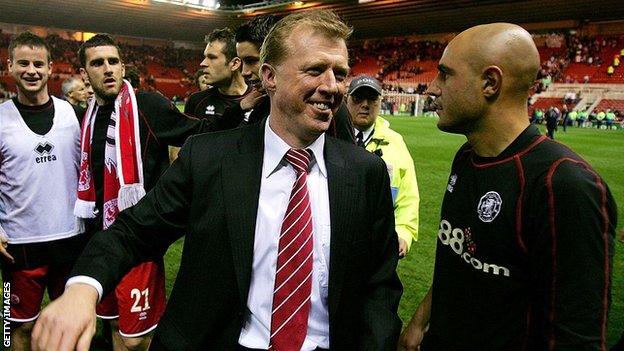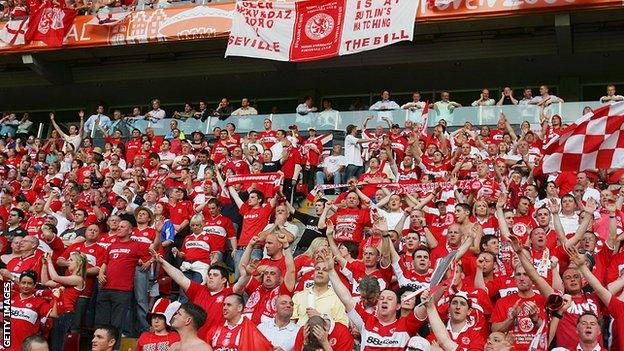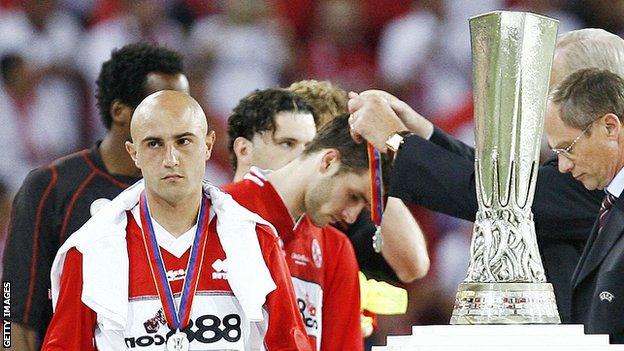Middlesbrough's run to Uefa Cup final remembered 15 years on by those involved
- Published

Steve McClaren's European exploits with Middlesbrough were a key factor in his appointment as England manager
"The greatest night in the history of football," screamed the late Alastair Brownlee, legendary radio commentator and "Voice of the Boro".
Middlesbrough had done it the hard way, but they'd beaten Steaua Bucharest in the semi-final of the Uefa Cup.
Only 20 years earlier, the club had been saved from liquidation by chairman Steve Gibson. Now, they were on the cusp of European glory.
On 10 May, 2006 - exactly 15 years ago - Boro headed for Eindhoven's Philips Stadion, where Sevilla lay in wait in the final of the competition that subsequently became the Europa League.
Whatever happened, two years on from lifting the Carling Cup, Boro's only silverware in their 128-year history up until that point, manager Steve McClaren and his players had already left their mark.
Their story was a remarkable one; two cup final defeats in 1997 were followed by relegation from the Premier League, but this time, Boro were looking up.
European football hadn't even been on their minds before, but it was a chance to put the town of Middlesbrough on the map.
"One of the reasons we went to Middlesbrough was they'd always been a cup team," McClaren, who left his role as Sir Alex Ferguson's assistant at Manchester United and headed for Teesside in 2001, tells BBC Sport.
"In 2004, we won the cup, and Europe was a by-product of that. Reaching Europe wasn't the goal, the goal was to win a cup. We didn't sit there after beating Bolton Wanderers and think: 'Oh, great, we're in Europe'. It was all about the trophy.
"Then we wanted to compete; as they say, Boro were 'a small town in Europe'. We had to build the squad; we had to reassess."
The final would be the culmination of a two-season journey in the Uefa Cup; the result of all of McClaren's hard work. In 2004-05, Boro balanced a seventh-placed Premier League finish with reaching the last 16, but surpassed that in stunning fashion a year later, beating Roma, FC Basel and Steaua to set up a meeting with Sevilla.
'The football gods had written it in the stars'
One historic comeback en route would have been enough to immortalise that team, let alone two.
Against Basel in the quarter-final, an early goal in the second leg at the Riverside Stadium meant Boro needed four to progress.
Amazingly, Massimo Maccarone scored in the 90th minute to complete the job, after a brace from Mark Viduka and a Jimmy Floyd Hasselbaink strike.
Brownlee, from high up in the gantry, called it the "greatest comeback since Lazarus".
Exactly three weeks later, it would be surpassed. Boro were back at home and chasing again. After a 1-0 defeat in Bucharest, two goals for Steaua gave Boro an identical task.
Somehow, they rallied once more, with Maccarone, their super sub, at the heart of the drive. He scored first, before second-half goals from Viduka and Chris Riggott, and made himself the hero again in the penultimate minute of normal time.
"It was a strange arrangement for the semi-final," Dave Allan, head of media and communications at the time, says. "We'd been told by Uefa that if we qualified, there was a meeting in Eindhoven the following day.
"The game wasn't going to finish until 9.45pm. We'd packed our bags ready to go, and we had to catch a 6:30am flight from Teesside to Amsterdam. We qualified, and we didn't even leave the stadium until well after midnight.
"When we were 3-0 down on aggregate, I remember texting my wife saying: 'It's all over, at least I don't have to get up early in the morning. There's no coming back from 3-0 down again!'"
Things looked bleak when Boro captain Gareth Southgate was forced off with an injury, and it was McClaren's assistant Steve Round who implored him to put Maccarone on. He scored just seven minutes later.
"Steve's advice was to put Maccarone on the right-hand side, Stewart Downing at left-back and Yakubu at left wing. We had an unbelievable front line of Maccarone, Viduka, Hasselbaink and Yakubu and full-backs of Downing and (Stuart) Parnaby. We went for it, it was gung-ho and fortune favoured the brave.
"I always say that lightning never strikes twice in one place. There it did; the football gods had written it in the stars, it was not for one night, but two. It was an incredible night, full of drama."
'We just had momentum'

Middlesbrough's fans travelled in huge numbers to Eindhoven for the final
Downing, who was just 21 at the time, set up all four goals on the night. Only now does he look back and realise the level of their achievement.
"I just thought it was the norm, but now you think how unbelievable it was to do what we did, as a so-called unfashionable club, not one of the big ones," he says. "We just had momentum, that was the big word; we deserved to be there and we were full of confidence.
"We had lads in the box like Jimmy and Viduka who thrived off service. That is how we got through a lot of games. Maybe teams just thought: 'It's only Middlesbrough, we'll beat them'. But it was definitely something we worked on, we always had at least two strikers on the pitch. If you watch my cross for Massimo's goal, I don't even look, I just put it in the area. I knew he'd score."
It was Viduka who galvanised the team at half time, with a rousing speech that made McClaren's job much easier. But Boro had all the motivation they needed heading into the Steaua game, having lost in the FA Cup semi-final to West Ham United only days earlier.
"I remember being on the bus home from Villa Park and it was flat," Downing continues. "We had the return leg against Steaua coming up, and it was like: "Oh, god!" Then four days later, we are on a massive high. It was mental football."
'It was one match too far'

Massimo Maccarone led a nomadic existence before and after his time at Middlesbrough, with his club career taking in a total of 12 teams, six loans and even a spell in Australia
It was a season of highs, including home victories over Manchester United, Arsenal and champions Chelsea. Yet, one dark afternoon in February stands out as a key moment for McClaren, who had a season ticket thrown at him by an angry fan as a Luke Moore hat-trick inspired Aston Villa to a 4-0 victory at the Riverside.
"We'd put all our eggs in two baskets, and the league was suffering because of that," he admits. "I had to wait to escape out of the back door of the stadium after the game; everyone was calling for my head. I had one of the best chairmen in Steve Gibson, but I thought he was going to sack me. That night, he took me upstairs and I thought: 'Oh, this is it.' I got up to his office and there was a pint laid out for me. He just said: 'Get that down you!'
"A week later, we beat Chelsea 3-0."
Speculation was rife that McClaren would be replacing Sven-Goran Eriksson as England manager by the spring. Allan believes that didn't help Boro's cause, but McClaren says it was put to bed well before the final.
"I thought his ambition was too much," Allan says. "I'd always give him a briefing before a press conference. We went through his notes and he says: 'All these questions are about England, not about the match.' I said: 'There aren't going to be any questions about the match. The story is 'Is Steve McClaren the new England manager?' He says: 'That is a bit off, isn't it?' I said it was fair enough, and just as I was about to leave the room, I turned and asked: 'You're not going to take it, are you Steve?' He said: 'You don't turn down the England job, Dave.'"
"Everything was decided before [the final]," McClaren recalls. "There were more things that could have sidelined us during both semi-finals. After that we were focused and I could put England to one side. We prepared like mad for Sevilla."
The final proved too much in the end. Sevilla won 4-0, thanks to goals from Luis Fabiano and Freddie Kanoute, which sandwiched an Enzo Maresca brace. Three goals were scored in the final 12 minutes.
"It was one match too far," McClaren adds. "We'd had a backlog of fixtures; we had to play Fulham and Everton and we were on our last legs. Maybe if the FA Cup run hadn't happened, we'd have had the energy for the final. Sevilla were head and shoulders above anyone in that competition. We took risks like before, but we got punished."
"We turned up and we had the belief to beat them," says Downing. "Ten or 15 minutes in, you think: 'Wow, nobody has done this to us before.' The speed of their play was something else; I had Jesus Navas and Dani Alves down my side. The combinations they were playing were incredible. We couldn't get the ball into areas to hurt them; Alves just played so high and had so much possession. I think we'd reached our level; we had a go late on again, got the strikers on, but they picked us apart."
Southgate retired and replaced McClaren as manager that summer, but Boro were never able to build on the foundations he left. After finishing 14th in the league that season, they reached 12th and 13th before relegation in 2009. They have only been back to the top flight once in 11 years.
But the likes of Downing, who left and then returned before leaving again for Blackburn Rovers, and McClaren, a resident of the area even today, will always be fondly remembered for making Middlesbrough a small town in Europe.

Snowfall is back: Hard-hitting drama about the crack epidemic in 1980s LA streaming now
How Gen Z is learning to adapt and thrive: Young entrepreneurs find new ways to make money in Covid times
